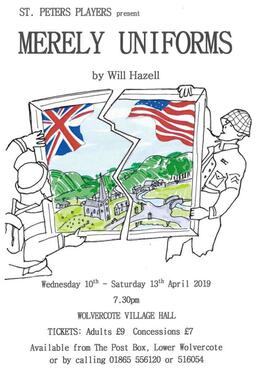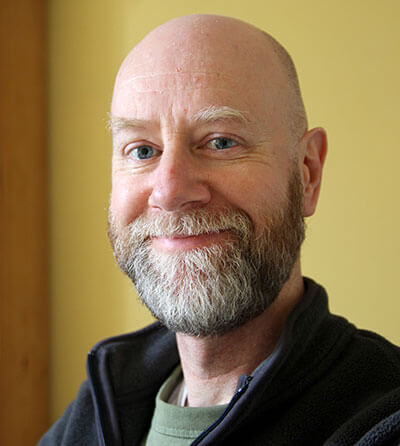|
MERELY UNIFORMS by Will Hazell
St Peter's Players Wolvercote Village Hall, Wolvercote Green, Wolvercote, Oxford, OX2 8BD 10-13 April 2019 Merely Uniforms is an ambitious play for several reasons. Firstly, it deals with big, serious subjects. Secondly, it has a large cast (over twenty) on a small village hall stage. Thirdly, it advertises itself as a comedy-drama; always a difficult genre to pull off successfully. How far did the resulting production match up to the high bar they'd set themselves? Actually, surprisingly well (with a number of caveats, of course). Will Hazell wrote and starred in this rather different take on the home front during the Second World War. It is an examination of the conflicts, rivalries and insecurities thrown up in a society engaged in total war, and how those external forces interact with the pre-existing social and emotional issues troubling individual characters. It also questions the nature of war itself and the tension between society, its institutions and the individual. Oh, and it also throws in some comedy as well. You understand my point about its being ambitious. It is 1944, and we are in the isolated village of Little Widdle, a community that prides itself on keeping the outside world at a distance. The trouble is, wartime has brought the outside world to the heart of the village in the shape of the Army, the RAF and the US Army. The village pub, the Angry Mallard, has been taken over by the armed forces, and fights and disorder have become the order of the day. Worse still, the outsiders have set up camp on the site of the village festival. This is an event that has taken place annually since the seventeenth century, and represents something very important about the identity and self-confidence of the village. The village committee, under the leadership of Mr and Mrs Caswalden (Andrew Churchill Stone and Yvonne Janacek), decide that something must be done. They hatch a cunning, albeit rather far-fetched, plot to sow conflict and division between the RAF and the US forces, in the hope that the resulting chaos will persuade their commanding officers to remove the troops from Little Widdle. In the end, the plan is successful but redundant, as D-Day intervenes, and all the armed forces leave for Normandy. The festival is saved, but everyone involved has learned something valuable about themselves and others. The main sub-plot of the play is the burgeoning romance between the awkward, bookish Private Harold Furze (Will Hazell) and Clementine Phillips, the village school teacher (Charley Middleton). Harold is a fish out of water in the Army: geeky, shy and incompetent when it comes to military duties. Somewhat naively, he is surprised that the Army is constricting his individuality! He confides these thoughts to Clementine. She in turn tells him of her cynicism about the war, her repulsion at the death... on both sides. Although these scenes between Harold and Clementine charted the growing together of the two lovers, they tended to be a bit preachy and seemed more taken up with delivering a message rather than revealing a relationship. Nevertheless, the strong performances of Will and Charley drove the scenes along, in spite of some shortcomings in the script. More successful, I thought, was the conflictual relationship between Harold and his fellow soldier Private George Gibbles (a terrific performance from Isaac Alcock). 'Gorgeous' George is permanently 'on the pull' with female military personnel and regards Harold as 'a posho'. They come from different worlds. Yet their reconciliation, thanks to their comrade Private Roger Rowlands (a nicely understated performance from Tony Bywaters), avoided cloying sentimentality. A simple handshake and a bit of embarrassed foot-shuffling delivered the punch of emotional truth. The one piece of high emotion that did work was from Clementine's father, Capt. Trevor Phillips (full praise to David Smith for his character's journey from stuffed shirt old buffer to tearful breakdown and back again). Capt. Phillips has always refused to speak about Clementine's late mother, who died in the First World War. Clementine is exasperated and resentful of her father's mute response whenever she raises the subject. Her father's refusal to divulge is driving them apart. It feels as though a part of her is missing, she confides to Harold. The dam breaks at the end of the play, as her father pours out his grief to Clementine, and she finally discovers how her mother was killed by enemy action, leaving the infant Clementine the sole survivor in a bombed-out building. Surrounding these serious matters was an array of more comic characters, providing light relief from the heavier material of the play. I particularly liked Jane Hemmings' performance as Lady Beatrice Ryder, who holds nightly parties for servicemen at her home, determined not to miss out on the delights of soldiers away from home. This was a well judged, enjoyable comic performance as a predatory Amazon. Her mother, Lady Petunia Ryder (Elizabeth Kirkham), is hardly less restrained in her picking the low-hanging fruit of sex-starved soldiers and airmen. Lady Beatrice's cousin Squadron Leader Frederick Swallow (Pete Drury) presented us with a Blimpish caricature of the British officer class: utterly out for himself and passing up no opportunity to bed young women. Pitted against him is US Army Major Billy Steelman (Sean Hazell), equally libidinous and confrontational towards his British counterpart. Their stand-up argument at Lady Beatrice's dinner party triggers the conflict between British and US service personnel that has been planned by the village committee. Co-ordinating a cast of more than twenty actors on a small stage was certainly a challenge for director Pete Welply, but he managed without ever making the place seem crowded. There was adroit use of upstage and downstage areas, especially in the scenes in the village pub. The set design was simple yet effective, and scenery changes were mostly carried out efficiently in the time available (although not always terribly quietly!). This was a difficult and, in many ways, complex, play to stage, but Pete Welply achieved a production that delivered sufficient emotional impact and entertainment value. Will Hazell's well structured new play set its sights high. Although occasionally falling short of those lofty goals, the resulting production surprised the present reviewer, in a good way, and certainly made the journey to Wolvercote Village Hall worthwhile.
0 Comments
Leave a Reply. |
About the Author
Mike Lord has been involved with amateur theatre for over twenty years, mainly as an actor but also, more recently, as a director. Archives
July 2019
Contact me
Please use the Contact Form for anything apart from comments on blog posts. |


 RSS Feed
RSS Feed
